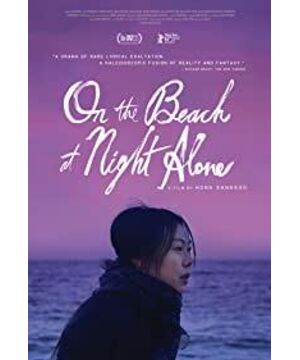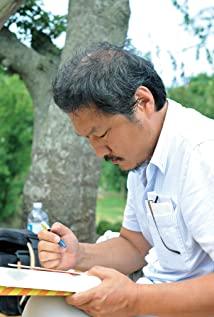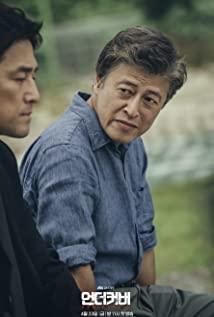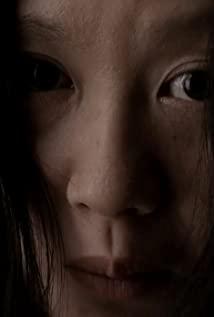"On the Beach Alone at Night", when we first saw the title, we could find that its subject was lacking. It only tells us an uncertain point in time and space, but it doesn't tell us who is the subject of the action, is it a human or a non-human? Is it a subject or an object? We can only hear the rustling of the sea breeze and perceive only a state, a state of being on the edge of an open world. Perhaps the image subject in this state is generated by wandering between the infinite and the finite of the world: such wandering may be an inward introspection and self-reflection, or an outward concern about Endless and eternal exploration.
The film begins with a zoom shot that expands the focus from the limited view of Kim Min-hee (Yong-hee)'s face into a medium shot. The first situation is generated. In the context, we see Yong-hee having a conversation with a friend in an exotic coffee shop. The two women, cultural and gender other, came to a foreign country, chatting in Korean, while the foreigners in the cafe continued their busy lives. Afterwards, they chatted while walking, chatting about gas, food, life, unattainable love... The views of each other were full of irreconcilability, but the words seemed to disappear after being revealed from the lips. Perhaps it is the foreign field and each other's pretentious masks that swallow up the originality of the mother tongue? With questions, we then see the two walk into a bookstore. Yongxi talks to the owner of the store who has cancer in jerky English, buys a piano sheet music composed by him, and then goes to a foreign friend's home for dinner with his friends. . It seems that the mother tongue has gradually been alienated into English, and the subjectivity of the image has been eliminated. But we can find that these heterogeneous situations and characters are so friendly and sincere, they embrace and embrace these foreign people so sincerely, so that they can choose either English or their mother tongue, making them as The anxiety of the object gradually fades and disappears. Therefore, a kind of resisting image is generated-Yongxi and friends, they do not "invade" the foreign land with the identity and language of the colonists, but by revealing their own trauma and their most authentic feelings. Infecting this field, it shakes the ordinary and homogenous daily life, and reappears the absent life and emotion. Thus, in the place of identity, region, and individual ruptures and differences, there is no longer a binary opposition between subject and object, and a new flow is formed. Environment, people, Yongxi... become a "symbiosis"— - And all of this is in response to the moment when Yongxi knelt by the bridge and prayed to the vastness of the world. That moment seemed to signal her wish: to go into the world, together with my body and my secrets, to let the bleak wind and the boundless woods engulf my everything.
We can all see Kim Min-hee in Hong Sang-soo's films "After", "Right Now", "Claire's Camera". She smoked, drank, and constantly satirized and ridiculed the men around her. She was often both a party and a puller. So she can mock those incompetent scumbags with bitter words, but she will also hide in the soju house and silently feel sad for her sensitive mood. She is the creator's self-reflection projection, a contrast to the worthless existence of the men around her, but at the same time a monologue of women's self-consciousness... Perhaps the confusion about Kim Min-hee's identity ambiguous and secret is just like Woolf's perception of people's desire to As amazed as she proposes the concept of writing "as a woman", the creation must produce a becoming-women who can spread across the social field like atoms, allowing men to enter into this gentle becoming. And Kim Min-hee's image is just such a coming-of-woman, she is both weak and hard and stubborn, no man, an outside dictator can subdue her vibrant potential, they will only be overwhelmed by her beauty Ashamed, and thus brought into her own becoming. There is a scene in the film where Kim Min-hee comes out of the cafe, humming a song, smoking a cigarette, and enjoying the charm of the dusk and the wind. At that moment, it seemed that everything around her was involved in her gently swaying posture. The flowing, smooth time has wrinkles, a breathing bubble is formed on the ribbon of time, hiding the feelings and secrets belonging to women, and the cruel and exhausted world can no longer disturb them.
"What time is it?" At 6 minutes and 35 seconds of the film, a man asked them, and they couldn't answer because they didn't bring their mobile phones. And 28 minutes is the shot of Yongxi sitting in the cinema. Our confusion arises because of this, is this journey in a foreign country real? Or was it just a movie that Yongxi watched? The woman who accompanied him in the follow-up never appeared, but that foreign trip was constantly mentioned by other friends of Yongxi. There seems to be a Bergsonian stretch of time here—exotic, dreamy, or cinematic, as well as Yongxi’s own time, forming an inseparable stream. And such time cannot be recorded by clocks and space, it will only be attached to the image, and it will continue to innovate itself with the change of her life. So, Yongxi kept walking into the crowd, into the fickleness of the world. In the exchange, collision and resistance, as mentioned in the first paragraph at the beginning, Yongxi became an explorer. The soft and hard particles on her body slowly penetrated into those pale situations, shaking the numb hearts of daily life and people that were rigid like cancer day after day. At 1:07, the man who asked the time appeared again, this time he no longer asked anyone, but gently and firmly wiped the window of Yongxi's hotel. Because he understands that time can no longer be quantified, Yongxi has become time and duration itself.
The most impressive scenes in the film are undoubtedly the moments when Kim Min-hee wanders by the sea. The frame of the scene was untied, and she kept falling into sleep and contemplation. A purely audio-visual situation is thus formed: sea water, gravel, and wind, dancing to the accompaniment of classical music. Through Yongxi's eyes, we also see Yongxi's powerlessness - the powerlessness that cannot fight against the world, the powerlessness that cannot be integrated into all things. Is the end of the sea the end of all nightmares, or is another endless beginning? Her tired eyes and slumped body all showed her confusion, and the time she carried had robbed her of too much vitality. We seem to have got a chance to spy on Yongxi's secrets, and she has become a "thing" in an unconcealed state. But just like the pair of peasant shoes in Van Gogh's writings, they belong to the earth, and can only maintain their own self-sustainability when they are on the feet of the peasant woman. So, Yongxi finally woke up, and she went back to the world that coexisted with her, back to the hustle and bustle. Because even if her anger and unease are not worth mentioning to the boundless world, even if she is still only a gender "object", as long as she still exists and explores, it is the best resistance to nothingness and life. The sweetest gift ever.
View more about On the Beach at Night Alone reviews











